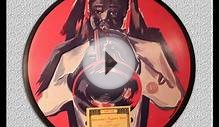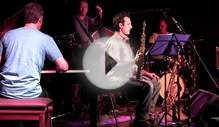
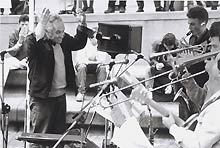 Terry Milligan, Portrait of Don Burrows, 1986, picture: silver gelatin. Courtesy of the nationwide Library of Australian Continent:an24522110-v.
Terry Milligan, Portrait of Don Burrows, 1986, picture: silver gelatin. Courtesy of the nationwide Library of Australian Continent:an24522110-v.
Australian continent has already established a good and radiant jazz scene since the 1920s, commencing with going to performers and reciprocated by Australian jazz performers touring frequently in the us and Europe.
Mainstream jazz centres on 'swing', although many jazz designs combine elements of improvisation in addition to 'jazz swing feeling'. A-swing sensation is a rhythm with a constant tempo. In jazz terms this requires most syncopation (accenting records before or after the beat) and a consistent rise and autumn of tension.
Swing dominated the popular party varieties of the 1930s after the swing feel became very popular in belated 1920s. The principal movement of the 1950s had been 'mainstream' which centred on 'Swing', although it overlapped with 'Be-bop' and 'Latin', brand new modern-day types which had emerged within the 1940s.
Australians have actually contributed to the modern-day and traditional noise, and generating initial noises by blending jazz types and helping establish 'Nu' jazz. Revolutionary Australian jazz is contributing a defining side to Australian songs.
Jazz - a short history
Jazz emerged round the late 1800s, in the post-slavery duration, in New Orleans, a city that has been intensely musically focused. Brass bands were current at virtually every personal activity. Ragtime groups, vocalists, and pianists proliferated. Small town and settlement rings developed songs which blended ragtime and metal along with other impacts eg slave songs, African rhythms, spirituals, folk songs, the blues, chapel music, and dance songs.
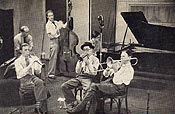 All of those elements contributed to a different type of songs which was special on African-American populace of south USA. Jazz is usually known as 'the United states ancient songs' and is regarded as the most important efforts to music to emerge within the twentieth century. Jazz groups usually include a rhythm, bass and percussion section. Groups can range in dimensions from trios (usually piano, double-bass and drums) to big groups all the way to 16 tools (including trumpet, saxophone alongside metal tools) and every thing among.
All of those elements contributed to a different type of songs which was special on African-American populace of south USA. Jazz is usually known as 'the United states ancient songs' and is regarded as the most important efforts to music to emerge within the twentieth century. Jazz groups usually include a rhythm, bass and percussion section. Groups can range in dimensions from trios (usually piano, double-bass and drums) to big groups all the way to 16 tools (including trumpet, saxophone alongside metal tools) and every thing among.
Early jazz recordings and contemporary jazz styles
Bruce Hart, women and gentlemen, Mr Bernie McGann - a jazz life. Image due to the nationwide Library of Australia: an21914787.
The earliest jazz wasn't recorded. In 1917, the white Original Dixieland Jazz Band made the very first jazz recording. This resulted in an explosion when you look at the popularity of jazz throughout America. Chicago was the jazz center worldwide in 1920s because of the move indeed there of the latest Orleans groups. By 1920, nyc had really and really caught the jazz bug. From nyc, jazz then distribute throughout the world.
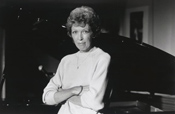 As it distribute, it evolved into different forms. Jazz begun to swing more within the late 1920s and in to the 1940s. A lot of it was played by huge bands, which is known as the top musical organization period. Swing had been the preferred style in jazz history therefore attracted countless performers.
As it distribute, it evolved into different forms. Jazz begun to swing more within the late 1920s and in to the 1940s. A lot of it was played by huge bands, which is known as the top musical organization period. Swing had been the preferred style in jazz history therefore attracted countless performers.
Be-bop may be the name when it comes to very first modern-day jazz style and it is seen as more technically challenging. 'Cool' jazz created as a reaction to bop. Latin jazz was a term accustomed describe the Cuban and Brazilian rhythms which grew to become heard by viewers in 1950s.
Bernie McGann, one of Australian Continent's leading jazz saxophonists, was playing in Sydney considering that the 1950s along with his forty-year job parallels the important advancements in modern jazz. Bernie McGann reflects the Cool Jazz style in his album Bundeena.
Jazz is recognized as a form of popular music to the degree it is made use of as party, film or dance music. However, it is not well-known when it comes to its market or its roots – rather it is considered art music.
Jazz in Australia - preferred and unconventional
Whenever jazz initially achieved Australia into the 1920s it shot to popularity as dance music, though it was not before end of World War II that jazz became undoubtedly well-known in Australia. In December 1946, the first Australian Jazz Convention occured in Melbourne and became an important gathering location for popular Australian jazz artists. The convention has been held yearly from the time. With this post-war period, jazz appeared in groups, concert halls and resorts. Quickly jazz communities, festivals and dances had been springing up from coast to coast.
INTERESTING VIDEO
